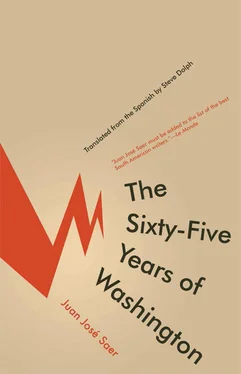Juan José Saer - The Sixty-Five Years of Washington
Здесь есть возможность читать онлайн «Juan José Saer - The Sixty-Five Years of Washington» весь текст электронной книги совершенно бесплатно (целиком полную версию без сокращений). В некоторых случаях можно слушать аудио, скачать через торрент в формате fb2 и присутствует краткое содержание. Год выпуска: 2010, Издательство: Open Letter, Жанр: Современная проза, на английском языке. Описание произведения, (предисловие) а так же отзывы посетителей доступны на портале библиотеки ЛибКат.
- Название:The Sixty-Five Years of Washington
- Автор:
- Издательство:Open Letter
- Жанр:
- Год:2010
- ISBN:нет данных
- Рейтинг книги:3 / 5. Голосов: 1
-
Избранное:Добавить в избранное
- Отзывы:
-
Ваша оценка:
- 60
- 1
- 2
- 3
- 4
- 5
The Sixty-Five Years of Washington: краткое содержание, описание и аннотация
Предлагаем к чтению аннотацию, описание, краткое содержание или предисловие (зависит от того, что написал сам автор книги «The Sixty-Five Years of Washington»). Если вы не нашли необходимую информацию о книге — напишите в комментариях, мы постараемся отыскать её.
The Sixty-Five Years of Washington — читать онлайн бесплатно полную книгу (весь текст) целиком
Ниже представлен текст книги, разбитый по страницам. Система сохранения места последней прочитанной страницы, позволяет с удобством читать онлайн бесплатно книгу «The Sixty-Five Years of Washington», без необходимости каждый раз заново искать на чём Вы остановились. Поставьте закладку, и сможете в любой момент перейти на страницу, на которой закончили чтение.
Интервал:
Закладка:
Ultimately, as they say, and to say it a second time, though it’s always the Same, no? every thing. He even rang up the man he calls his best friend, Lopecito, to suggest going fishing on the island the following week. And Leto, on the bus, is willing to let himself be carried along, with a somewhat uneasy sense of calm, through those warm and beautiful spring days, to the following Wednesday, on the island near Rosario. That anticipation saturates the entire weekend: arriving in the town, crossing the streets and the bus station, passing the windmill, arriving at his grandparents’ house, the dinner, the evening walk through the town, the croaking of the frogs, the intermittent song of the crickets that has always attended, and no doubt preceded, the human night, the intermittent, phosphorescent glow of the fireflies, the smell of the paradise trees, the family gathering on Saturday with the relatives who have been arriving from nearby towns in cars or on the bus, the organized abundance, formed by identical objects repeated over and over in the store, the night spent under the crucifix, the mass, the cookout at noon on Sunday, the women’s flower-patterned dresses, the walk around the station with the cousins, and more than anything else, the perfect hour on the plains, the afternoon, and also, every once in a while, in little outbursts to someone in the family, Isabel’s foolish declarations of her marital bliss, her upward mobility, her sexual satisfaction, her economic stability, her familial harmony, her religious tranquility, her physical well-being, which he lets run on like background noise whose fictitiousness intrigues him less than its obstinate and emphatic repetition. That insistence betrays her uncertainty, the same way that, on Sunday night when the bus arrives at Rosario Norte, the thing she murmurs, slightly distracted, Hopefully he hasn’t made anything for dinner because I could pop after everything we ate in Andino , could be translated, Leto thinks, into a way of saying the opposite, because the fact of him waiting with a warm dinner would help dispel the uncertainty that’s working on her and which is of such a curious nature — when it manifests itself externally, it always appears to be the opposite.
The man is not at the station, It’s good he didn’t come , murmurs Isabel, after scrutinizing the walkway and the entrance. It’s good he didn’t come because anyway we don’t have suitcases and the train leaves us a block away . Leto, who after so many years has become an expert in the art of pretending he hasn’t heard anything, or of responding, almost inaudibly, with vague monosyllables, to every irrational, or, as he refers to them privately, false bottom argument laid out by Isabel, turns the conversation to fresh eggs, their bouquet of flowers, the greasy chorizos just made at the farm stand and plied on them in the town.
Slowly they leave the train, walking away from the palm trees lining the avenue to enter the dark, tree-lined block that separates them from their house. Isabel isn’t, Leto thinks, in any hurry to get there, as if through some physical inertia her body, contrary to her reason, were trying to express things more truthfully. Twice in a single block she stops for several minutes to talk with neighbors who, sitting in folding chairs on the sidewalk near their front doors, or leaning out a window, have come out to enjoy the cool night, while Leto, keeping a polite distance, with the basket of eggs and chorizo in one hand and an unlit cigarette in the other hand, asks himself if she isn’t trying to gain time so that he, who she supposes innocent of machinations and exempted from her intuition, will overtake her and get home first — and all of this in spite of the fact that, to the outside world, they are just a mother and son, a silent twenty-year-old young man, coming back, respectable, straightforward, and a little tired, from a weekend in the country, neighborhood people, apparently the husband is an electrician who works on televisions and doesn’t mix much with the neighbors, the boy studies accounting, and she’s still pretty even though she’s around forty, the men more or less silent and withdrawn, while she sometimes maybe has the habit of talking too much, like she can’t stop, or she’s trying to hide, to cover up, with words, deep dark fissures which her words, despite her intentions, open at their multiple, secret edges. But she doesn’t give up. Leto waits, patiently, or a little callously, rather, at every stop, and when they get to the house, which is dark, silent, and lifeless, and he slides the key in the lock, and turns it, he feels again, coming through the door, the trail of the snake, the indefinite but distinct presence of the scorpion, whose signs, weakened in the previous weeks, have returned, unequivocal and palpable. When he turns on the light, this presence draws him, sucks him, slowly, toward the bedroom, and when he sees the man sprawled on the floor, his skull shattered by the gunshot, the revolver still in his hand, the floor, walls, and furniture splattered with blood, with chunks of brain, hair, bone shards, he says to himself, calmly and coldly, So that’s what this was . Specifically, this meaning the days, the nights, the time, the body, the world, the thick beating life, how the man, in his little electrical workshop, had dismantled them, detaching and separating them into separate pieces, colored cables, copper wires, gold screws, spreading them over the table to inspect them one at a time, neutral and merciless, limiting himself to reaching what he no doubt considered objective conclusions, and later, during uniform and meticulous hours, putting everything back together according to the indisputable logic of his delirium. To achieve his goals he had to construct the comedy, setting a stage, the visible universe, and making all of his so-called loved ones take part, modifying the plot sometimes to convince the most reticent, as had been happening for the previous weeks with Leto, whose mistrust had forced him to make appearances outside his “workshop,” transforming his personality slightly and preparing, with Lopecito’s unconditional support, when he swallowed whole the supposed week of fishing on the island, for Leto, his reticence becoming hope, to fall, on his return from the country Sunday night, from an even higher rung. Put briefly, and by the man himself, no doubt to himself, and no doubt without words as well, more or less like this: When I say dance, everyone dances. No excuses .
Two or three days later the autopsy reveals that he shot himself on Friday at around 2:00 or 3:00 in the afternoon, meaning that he said goodbye with a grin at the station, reminding him before he left that on Wednesday they would cross to the island with Lopecito, then, still grinning, boarded the train back to their neighborhood, walked the block between the train stop and the house at a calm and regular pace, and no doubt without losing his grin entered the house, crossed the hallway, shut himself in the bedroom, and without hesitating or losing the fixed, vindictive grin, blew his brains out.
— I call that an insolent suicide, said César Rey, a few months later, at the bar Montecarlo, in the city, while they watched the sun, through the window, rising into a cold autumn dawn. And Rey can speak with authority because the day before, in fact, he had gotten a hotel room, intending to slit his wrists, but at the decisive moment he had suddenly changed his mind, and after leaving the hotel, he had run into Leto at the arcade’s bar, where they proceeded to go on a bender.
— The insolent suicide, says Leto, shaking his head. Isabel and Lopecito were left stupefied by the event — in the director’s absence they no longer knew exactly what role they played in the comedy — but Leto himself thinks he has known how to conserve enough cold blood to keep him from the path of the gunshot, though the suspicion of having been the primary target for the last few weeks could be, without his realizing it, proof of the opposite.
Читать дальшеИнтервал:
Закладка:
Похожие книги на «The Sixty-Five Years of Washington»
Представляем Вашему вниманию похожие книги на «The Sixty-Five Years of Washington» списком для выбора. Мы отобрали схожую по названию и смыслу литературу в надежде предоставить читателям больше вариантов отыскать новые, интересные, ещё непрочитанные произведения.
Обсуждение, отзывы о книге «The Sixty-Five Years of Washington» и просто собственные мнения читателей. Оставьте ваши комментарии, напишите, что Вы думаете о произведении, его смысле или главных героях. Укажите что конкретно понравилось, а что нет, и почему Вы так считаете.












